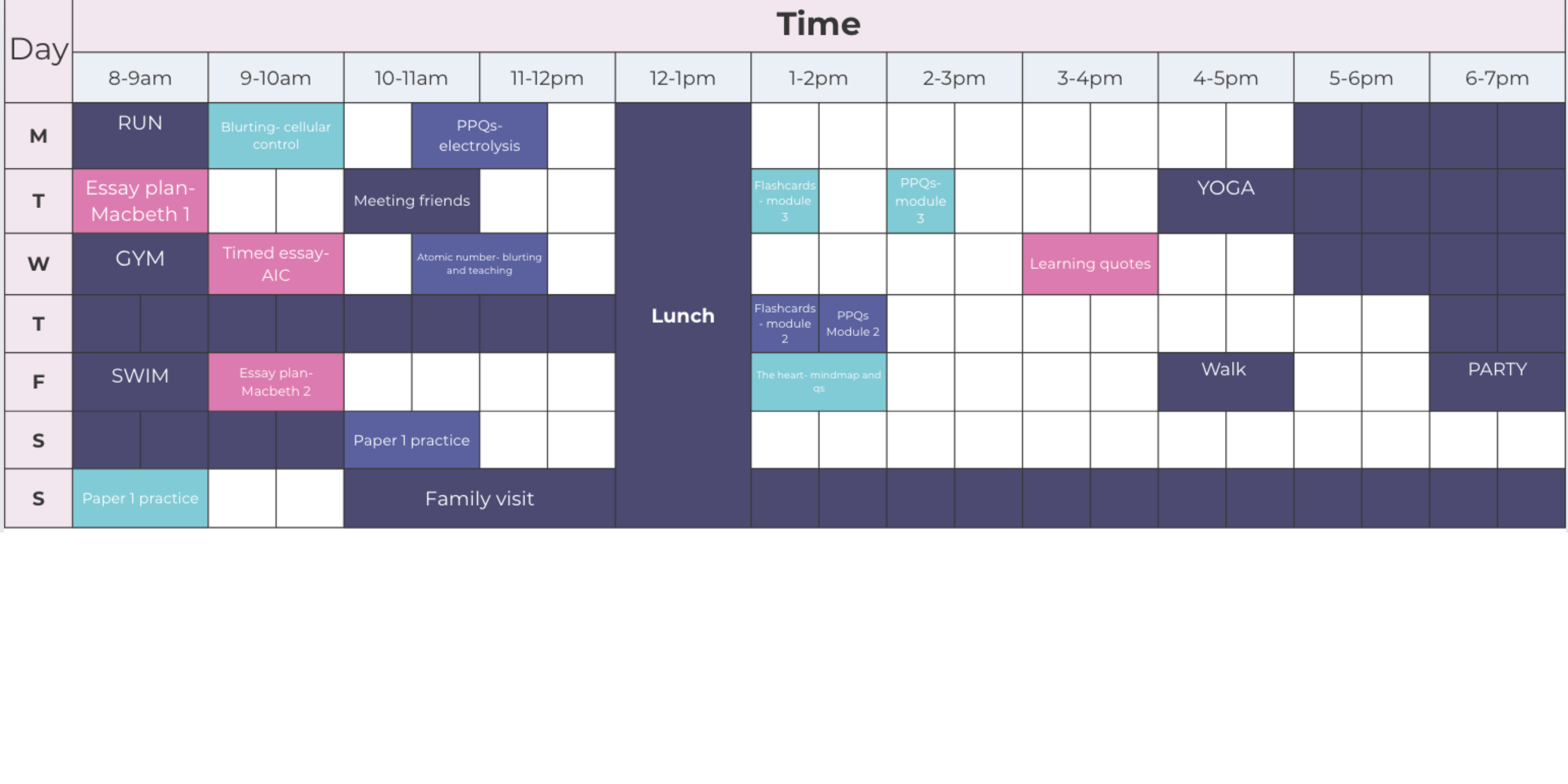
“How many hours per day should I be revising for GCSEs/A Levels during the Easter break?”
Apr 11, 2025A guide for parents and students with upcoming exams.
Introduction
The Easter holidays are a crucial time for students preparing for GCSEs and A Levels. With exams fast approaching, one of the biggest questions students and parents ask is: how many hours a day should you revise for during the Easter break?
Some students plan to revise all day, every day, while others struggle to get started at all. Too little revision can leave you feeling unprepared, but too much can lead to burnout, stress, and exhaustion. The key is finding the right balance between effective study sessions and well-deserved breaks.
For parents, it can be a difficult time, especially if you are at work, and relying on your teen to be productive and self-disciplined at home. You want to find the right balance between supporting and guiding them, but not feeling like you are nagging.
In this guide, I discuss:
- How many hours a day is optimal for those studying for exams
- The best Easter revision timetable to maximise productivity
- Effective time management strategies
- The importance of effective study methods
- How to balance study and relaxation
- Common study mistakes and how to avoid them
- How parents can support their teens during exam season
By the end of this post, you’ll have a clear, structured approach to revision that works for you.
Factors that affect how many hours you should revise
There’s no magic number for revision. The ‘right’ amount of time for one person may well be entirely different from another. The amount of time you should spend studying depends on several factors:
1. Your current level of preparedness
How much work have you already been doing throughout the course so far? Did you do well in your mocks? How many past paper questions have you already done? How prepared do you actually feel?
If the answer to these questions is “very little”, then it is likely that you have a bigger mountain to climb.
2. The subjects being studied
The number and type of subjects you are taking will play a factor in how much study time is required at this stage. For subjects with lots of coursework, or practical exams, a lot of this may well have already taken place, meaning that there may be significantly less material to study for.
Some subjects, like maths and English, require plenty of practice and not a huge amount of what we think of as ‘revision’. Other content heavy subjects like Biology and Geography require subject knowledge as well as exam skill practice.
All of these different requirements will also impact the overall study time required.
- Your learning style
We all learn differently and different methods work better for others. However, lots of students have misconceptions about effective study methods, often wanting to re-read or re-write notes. These methods have been scientifically proven to be ineffective, deceiving you into feeling like you are being productive, but not actually leading to long-term memory (known as ‘masked practice’). See below about effective study methods.
- Your mental and physical well-being
We cannot pour from an empty cup. We need to ensure that we are mentally and physically at our best to make the most of study time. This means scheduling breaks, sleep, social time and ensuring that we are exercising, eating healthily and drinking plenty of water.
The best way of analysing total time required is to write a list of all your subjects and topics needed to study. Then prioritise them- I find a traffic- light system to be the most effective. Assign a length of time you’d like to dedicate to each subject. This is likely to add up to a significant amount of time- much more than you have available over the holidays. If this is the case, you need to set your expectations: what do you absolutely need to cover- and how much time do you absolutely need to spend on each bit? It can feel a bit scary knowing that you physically cannot cover everything: it’s all about being smart with your time.
Be realistic: a couple of hours in the morning and a couple in the afternoon is realistic. 8 hours a day, 7 days a week is not, and will not give you better results.
Suggested Easter revision timetable
A well-structured Easter revision timetable ensures that students are covering essential topics while also allowing time for balancing revision and relaxation. Little and often is best and just plan a week at a time, as things change, and you can adapt as you go.
I advise the following steps:
-
Create a timetable with the correct days and times on. I suggest completing on something easily editable like Excel (and don’t spend time hand creating)
- Block out EVERYTHING: commitments, social time, exercise, eating, downtime, times you know you don’t work well etc
- Create a prioritised list of topics for each subject- I usually suggest writing out the exact task required and using one excel cell for each 30min or 1hr block.
- Add your topics to your timetable. Try to think about the type of task, and what part of the day each might work best in.
Example Revision Timetable
 Effective revision techniques
Effective revision techniques
Simply spending hours ‘revising’ isn’t enough, you need to revise effectively. Here are 5 strategies that can help!
1. Turn your specification into flashcards
Use your specification points to create Q&A flashcards- question on one side, answer on the other. Try and make your answer as close to an exam model answer as possible.
- The Feynman Technique
In simple terms, this is teaching a topic to someone else. Imagine they know nothing about what you are explaining (even if they do!). Teach it in as much detail as you can, and ask them to ask you questions too. You can always check your notes afterwards if you are unsure.
- Use post-it notes as triggers
Keep forgetting key words or vocab? Try popping post-it notes up around your house with questions on them in places you visit fairly regularly. As you walk past, say the answer out loud.
- Blurting
This is one of my favourites! Set a timer for 5 minutes and write down as much as you can on a particular topic. When you feel like you cannot write any more, just sit with it until the timer runs out: you’ll probably end up remembering so much more! When you have finished, use your notes to fill in or highlight any gaps.
- Past paper practice
These aren’t always the most fun, but will ensure you improve the most. Make you add in marking and reflection time afterwards, as there are lots of lessons to be learned, so you can re-focus your revision efforts appropriately.
Common mistakes to avoid
Cramming everything at the last minute - cramming can be useful for small amounts of information for a short period of time. However, most GCSEs and A-levels require you to know far more information than you can store AND they also test you on how you can apply your knowledge. Cramming at the last minute will not allow you to practise these skills.
Passive revision - passive strategies such as writing notes and re-reading do not allow your brain to make synaptic connections and so do not lead to learning. You may feel like this is productive, but you need your brain to ‘hurt’ for revision strategies to actually work.
Ignoring rest breaks - your brain actually remembers topics at the beginning and end of a session best, so shorter chunks of revision are actually best for memory retention. Strategies like Pomodoro are brilliant, although you will also need to intersperse longer sessions for papers. Make sure your rest is actually rest.
Not using exam board resources - remembering the content is only a portion of the challenge: for most subjects the majority of exams focus on how you can apply that knowledge. In order to get good at this, you need to practice.
How parents can support their teen’s revision
For parents, knowing how to support your child during exam season can make a huge difference. Here’s how you can help:
Encourage a routine - support your teen in planning, but let them lead. Help them identify when they work best, and encourage regular downtime, as well as opportunity for socialising. A flexible, student-led routine builds independence.
Creating a study-friendly environment - a clearly defined, tidy and distraction-free environment is optimal for learning. You can help your teen by helping them keep this clear and tidy.
Promote healthy habits - fuel their brains with regular, balanced meals and plenty of water. Encourage a consistent sleep routine and encourage no screens before bed.Try modelling this yourself. A rested brain is a productive brain.
Be understanding - try and be open minded about how much stress your teen is putting on themselves, and try not to add to this. Try and agree to some ‘ground rules’ between you: how much do they need you to make them accountable? Do they want you to test them? Do they need encouragement to rest more- or work more?
For more guidance for parents, download my “Top 10 tips for parents” here.
Final Thoughts
The Easter holidays are a chance to take control of revision, build confidence, and prepare effectively for exams. But remember, revision is about working smarter, not just harder. A well-structured revision plan, combined with the right study techniques, will help you perform at your best.
Stay up to date
Updates from EduKate Learning delivered right to your inbox.
I hate SPAM. I will never sell your information, for any reason.

